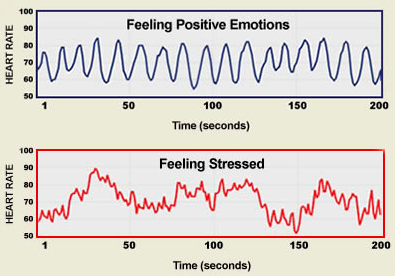Heart Rate and Variability Training - the Benefits, by Sport Psychologist Matthew Marini
February is Heart Health Month here at the ProActive Centre. We’ve been hard at work finding different ways to help improve our heart health, which is perfect timing to follow the New Year’s resolutions we set back in January. Over the years we’ve seen so much research showing how important physical activity, diet and nutrition is to our overall health and heart health. Recently, research is starting to show how having a healthy heart can actually help us improve our psychological health too.
Heart Rate Variability (HRV) is a new dynamic measure showing how our heart can respond to different life events and stresses, such as positive happy emotions or negatively feeling stressed out. As the picture shows our heart is more stable and slower when feeling calm, relaxed and positive, whereas when feeling stressed out, anxious and angry our heart rate begins to increase, become more erratic and it fluctuates more often.
Once we have completed a quick measurement of HRV we are able to assess how efficient our heart is in reacting to these different scenarios. Higher HRV scores mean that our heart is more capable of reacting to the negative experiences and quickly attempts to smooth out our heart rate back to normal. Lower HRV scores mean that our heart is less adaptable and reacts to life experiences slowly. However, all is not lost, Heart Rate Variability can be trained!
What is Heart Rate Variability Training?
HRV training is a fairly new training protocol that was created within the Sport Psychology world to help athletes regulate their heart rate and breathing during intense competitive stress[1]. HRV training has now been found to work for many other environments as well, such as test taking, job interviews, relaxation, and researchers have even found it to help cognitive anxiety, and depression[2].
So what’s involved in HRV training? Well the first step is to use a simple heart rate monitor strap in combination with a smartphone app that allows us to get a baseline measure of HRV. Once we have an individualized HRV score, we begin a 20 minute guided breathing training program that will help to keep our breathing at a slow and relaxed pace. Practicing proper breathing is a logical method to mimic a calming and relaxation sensation which will help to increase HRV. Researchers have found that when practicing HVR training at least once a day over three months resulted in improvements to the adaptability of the heart and baseline HRV scores.
HRV is one of the tools we can use to assess and improve your performance, training or anxiety levels during a Mental Performance Training Session. These sessions are offered one-on-one here at the ProActive Centre, and can be helpful in identifying and addressing performance issues at school, on the job or while competing and training for sports.
[1] Paul, M., & Garg, K. (2012). The effect of heart rate variability biofeedback on performance psychology of basketball players. Applied psychophysiology and biofeedback, 37(2), 131-144.
[2] Lehrer, P. M., & Gevirtz, R. (2014). Heart rate variability biofeedback: how and why does it work?. Frontiers in psychology, 5, 756.
Written by Matthew Marini, BA BSc MA MPC Certified Sport Psychologist


